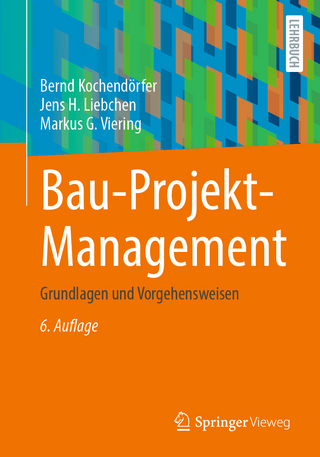
Barry's Advanced Construction of Buildings
Wiley-Blackwell (Verlag)
978-1-119-73488-8 (ISBN)
Since 1958, Barry’s Construction of Buildings has served as a standard guide to building practices and construction skills. The second volume of this two-volume format, Barry’s Advanced Construction of Buildings builds on the introductory material of the first volume to offer readers a thorough grounding in construction and its various facets. Emphasizing large-scale buildings, particularly those with load-bearing frames in timber, concrete and steel, and supported by chapters on offsite construction, piling, envelopes to framed buildings, fit-out and second fix, lifts and escalators, building pathology, upgrading and demolition, this latest edition incorporates critical new material, including
New questions in each chapter designed to enhance learning
Updates throughout reflecting the latest building practices and professional knowledge
A new focus on low-carbon construction
Barry’s Advanced Construction of Buildings is an essential tool for any student working towards qualifications in building and construction, and a handy reference for construction professionals in any area.
Stephen Emmitt, PhD, is Professor of Architectural Practice at the Department of Architecture and Civil Engineering, University of Bath, UK. He is an architect with industrial experience.
How to Navigate This Book ix
1 Introduction 1
1.1 The function and performance of buildings 1
1.2 New methods and products 8
1.3 Product selection and specification 10
Chapter 2 at a Glance 17
2 Offsite Construction 19
2.1 Functional requirements 21
2.2 Offsite design and production processes 24
2.3 Pre- assembly 27
2.4 Joints and joining 31
2.5 Prefabricated housing 32
2.6 Additive manufacturing (3D printing) 36
Chapter 3 at a Glance 39
3 Pile Foundations, Substructures and Basements 41
3.1 Pile foundations 41
3.2 Ground stabilisation 61
3.3 Substructures and basements 64
Chapter 4 at a Glance 83
4 Single- storey Frames, Shells and Lightweight Coverings 85
4.1 Lattice truss, beam, portal frame and flat roof structures 85
4.2 Roof and wall cladding and decking 127
4.3 Rooflights 150
4.4 Diaphragm, fin wall and tilt- up construction 163
4.5 Shell structures 173
Chapter 5 at a Glance 189
5 Structural Timber Frames 191
5.1 Functional requirements 191
5.2 Timber 193
5.3 Modified and engineered timber products 198
5.4 Timber- framed walls 202
5.5 High- rise structural timber frames 216
Chapter 6 at a Glance 219
6 Structural Steel Frames 221
6.1 Functional requirements 221
6.2 Methods of design 223
6.3 Steel sections 227
6.4 Structural steel frames 234
6.5 Welding 254
6.6 Fire protection of structural steelwork 269
6.7 Floor construction for structural steel frames 276
Chapter 7 at a Glance 291
7 Structural Concrete Frames 293
7.1 Concrete 293
7.2 Concrete mixes 298
7.3 Reinforcement 304
7.4 Formwork and falsework 316
7.5 Prestressed concrete 331
7.6 Lightweight concrete 336
7.7 Concrete structural frames 339
7.8 Precast reinforced concrete frames 350
7.9 Lift slab construction 356
Chapter 8 at a Glance 359
8 Envelopes to Framed Buildings 361
8.1 Terms and definitions 361
8.2 Functional requirements 362
8.3 Infill wall framing to a structural grid 372
8.4 Cavity walling 373
8.5 Facings applied to solid and cavity wall backings 376
8.6 Cladding panels 387
8.7 Sheet metal wall cladding 410
8.8 Glazed wall systems 420
8.9 Double skin façades 436
Chapter 9 at a Glance 439
9 Lifts and Escalators 441
9.1 Functional requirements 441
9.2 Lifts (elevators) 443
9.3 Escalators and moving walkways 454
Chapter 10 at a Glance 457
10 Fit Out and Second Fix 459
10.1 Commercial fit out 459
10.2 Raised floors 461
10.3 Suspended ceilings 465
10.4 Internal partition walls 470
Chapter 11 at a Glance 477
11 Existing Buildings: Pathology, Upgrading and Demolition 479
11.1 The pathology of buildings 479
11.2 Decay and defects 484
11.3 Conservation of buildings 488
11.4 Façade retention methods 491
11.5 Retrofitting 501
11.6 Demolition, disassembly and recycling 511
11.7 Reuse and recycled materials 515
Index 521
| Erscheinungsdatum | 17.07.2023 |
|---|---|
| Verlagsort | Hoboken |
| Sprache | englisch |
| Maße | 170 x 244 mm |
| Gewicht | 907 g |
| Themenwelt | Technik ► Bauwesen |
| ISBN-10 | 1-119-73488-6 / 1119734886 |
| ISBN-13 | 978-1-119-73488-8 / 9781119734888 |
| Zustand | Neuware |
| Haben Sie eine Frage zum Produkt? |
aus dem Bereich


